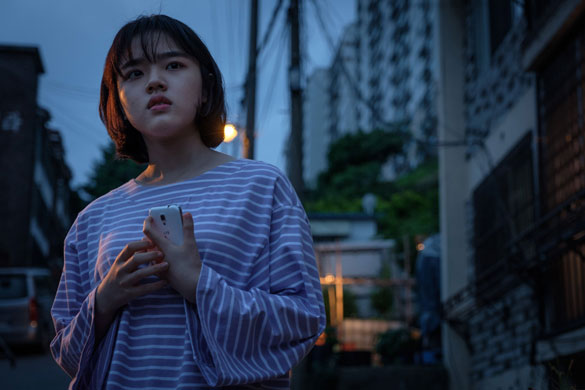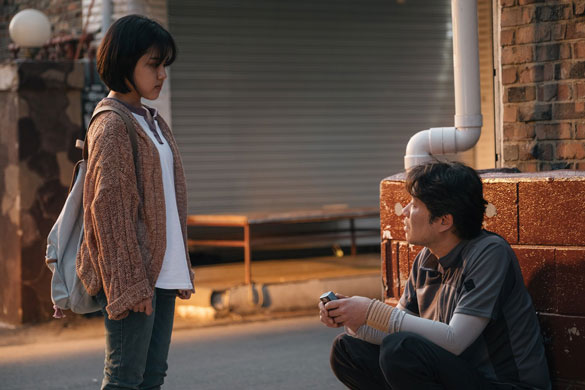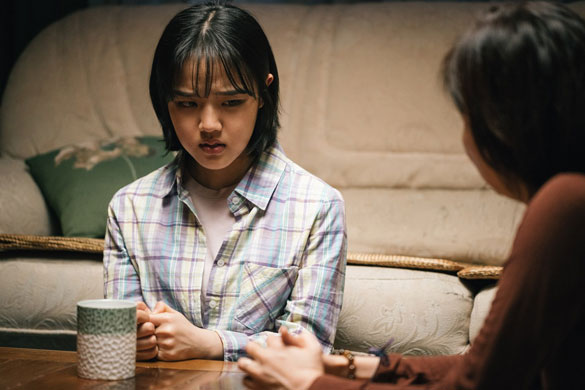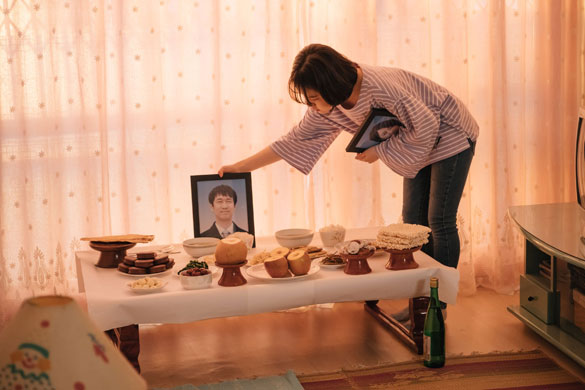"Why should I feel sorry? Shouldn't mum and dad be the ones feeling sorry?
What did they ever do for me? How dare they just die like that. Why did they have to die and make my life so hard?..."
Synopsis:
Nineteen-year-old Young-ju (Kim Hyang-gi) has been the guardian of her younger brother, Young-in (Tang Jun-sang), since both their parents were killed in a car accident five years ago. Struggling on a daily basis to even put food on the table, she not only receives no help whatsoever from her other relatives but also has to fight her aunt and uncle's repeated attempts to sell her apartment.
When Young-in is arrested for his part in a robbery with a group of other boys, the families of the guilty agree to settle out of court to the tune of $3,000 each, forcing Young-ju to approach her aunt in the hope of borrowing the money. Her aunt’s flat out refusal to help – in the process telling Young-ju she wants nothing more to do with her or her brother – pushes the teen well past the end of her tether and as she breaks down in tears at home she stumbles upon documents from the criminal trial of the man who killed her parents which include his name and address. Noting down his details Young-ju sets out incensed, determined to take her revenge on the man she blames entirely for everything that is wrong in her life...
Review:
Young-ju opens with a short dialogue between the titular character and her brother. In spite of lasting less than two minutes before fading to black accompanied by a gentle piano melody bordering between melancholic and sweet (moving from one to the other on being repeated as a musical motif, depending on the darkness or lightness of specific story parts it accompanies), this brief interaction not only succinctly explains that both their parents are deceased (pointed to further shortly after by Young-ju’s decision to put the black framed funeral photos of her mother and father in pride of place on a lounge altar for their memorial) but also underlines her sole guardianship of her little brother and indeed her deep love and caring for him regardless of his obvious tacit and sullen demeanour, her supportive feelings not least screaming out of actress Kim Hyang-gi’s nuanced and wholly natural facial expressions as Young-ju playfully tries to force an extra chicken drumstick on him.
Those background facts and character traits so quickly placed in viewers’ minds, the narrative is then free to focus on her daily physical (financial) and emotional struggles within an absolutely palpable air of isolation. Repeatedly in the early stages of the film, visual depictions show Young-ju standing on her own, head bowed, or indeed crouching head in hands utterly alone, whether in various alleyways; outside or inside her home, and whether you consider her efforts to deal with Young-in's acting out (all the while trying to show him love and support) or indeed look at her discussions with her deeply condescending aunt one thing is blatantly clear, that is her wholly negative interactions and failure to connect (through no fault of her own) positively scream that she is utterly, miserably alone with no-one to turn to whatsoever, having been forced into adulthood while still a child without any of the support a young woman needs to do so and be able to cope.
 |
Young-ju’s aunt consistently refers to her move from childhood to adulthood negatively and critically believing as she does that Young-ju has failed to make the move fully or adequately in spite of the fact that her utter lack of support for her niece is largely to blame for the very problems she claims to see – “You’re almost adult age so it’s time you started acting like one"; “You’re just a naive baby"; “You’re just kids in adult bodies”, etc. These cutting barbs at one point cause Young-ju to respond “I’m no longer a child, so I don’t need a mom” but as we (and she) are soon to discover that is exactly what she needs more than anything else, and indeed always has needed to allow her to blossom into womanhood naturally as her maturity grows rather than having her childhood stripped away and the weight of the world placed on her all too young shoulders.
The maternal figure Young-ju subconsciously yearns for (even if she doesn’t fully realise it herself) comes in the form of the boss of a tofu shop where Young-ju begins working and while this middle-aged woman, Hyang-sook (Kim Ho-jung), also regularly refers to Young-ju as not being fully a woman yet it is from a fully supportive, loving and even celebratory perspective (“There’s no need for my baby to cry”; “My Young-ju will be able to achieve anything she sets her mind to"; “My Young-ju isn’t like other kids today, she’s shrewd and good natured”) and no sooner than these celebration of Young-ju’s youth begin than changes in her demeanour come in a marked and almost instantaneous fashion: Cries of misery and desperation become tears of joy; and a hung head with an avoidance of eye contact becomes a raised, glowing and smiling face bathing in meaningful connection.
At one point in proceedings, Young-ju is shown crouched down at the Han River bridge crying for her mom and you can absolutely guarantee it’s not her deceased blood relative she’s referring to.
It’s regularly said that kids today grow up far too quickly. Director Cha Sung-duk's narrative for Young-ju deftly and definitively shows what can happen to the heart and soul when they’re forced to, and in an absolutely gripping manner throughout.
 |
Young-ju (the film) adds yet further thematic depth with its discussion of perceptions and changing opinions in the wake of full understanding, disclosure, blame and guilt in terms of Young-ju’s feelings about the man who killed her parents in a truck accident, his family and indeed their thoughts about her. Fear of (pivotal) spoilers keep me for being anything other than vague on this subject but rest assured such thematic statements are a driving force of the entire story; are pivotal to the success and believability of the other aforementioned themes; and are indeed vital to the film’s deeply moving ultimate conclusion.
If proof were needed that references to such changing attitudes and opinions infuse the film’s even tiniest of moments, one need only look at two scenes in which Young-ju is given food from the tofu shop to share with her family. In the first, she carries the black plastic food bag to an alley on the way to her apartment and unceremoniously dumps it into a pile of roadside rubbish. In the later second scene, she carries the food back with a look of gleeful appreciation on her face, her emotion changing to virtual trepidation as her walking slows to a standstill as the home she realises she no longer wants to return to comes into view.
Young-ju premiered at the Busan International Film Festival and though it did subsequently have a theatrical release it was shown on only one Korean cinema screen for a very brief period. One, I guess, should at least be pleased that Young-ju reached the cinema at all when so many other small independents are frankly ignored outside of the festival circuit, but such a fleeting, blink and you’ll miss it appearance is nonetheless an absolute shame for this is a strong, accomplished, multi-layered tale from a confident female director that is wholly deserving of being seen and appreciated by all fans of exemplary cinema, Korean or other, never for a moment appearing to be the debut feature it actually is.
 |
Since her days as a child actress in the early 2000s, Kim Hyang-gi has forged a career that has brought her numerous accolades as an acting talent to be reckoned with. Largely coming to the attention of critics and public alike as a result of her roles in 2012’s A Werewolf Boy and 2013’s Thread of Lies, she has since consistently shown through remarkable performances in critically acclaimed films such as Snowy Road and Innocent Witness, as well as record breaking box office hits such as Along with the Gods, that she can as easily hold an entire film by her acting talent alone in lead and co-lead parts as she can provide a steadfast base for those around her when playing a supporting role.
As far as Young-ju is concerned, Kim Hyang-gi frankly owns the film from start to finish, her frankly jaw-dropping performance increasing the film’s strength and memorability to the nth degree. Each and every tear is genuine, every cry is affecting, every smile utterly uplifting and even when she says nothing she is always speaking volumes.
Case in point: Caught unawares in a place she shouldn’t be, the character of Young-ju hides lying on the floor behind a veil surrounding a bed, as two others discuss her in the wake of a revelation (from their point of view), not knowing she’s there able to hear and listening. For the scene, Kim Hyang-gi was required to lie absolutely motionless with the camera fully face-on for over two minutes – not flinching, not blinking nor seemingly even breathing as she’s left speechless by the enormity of what she shouldn’t even be hearing. So successful is she in achieving this seeming abject paralysis that I for a time began to ask if the director had perhaps used a still image accompanied by audio, that is until someone turned a light off at the near end of the segment showing it was indeed live action. Not only frankly astonishing but also absolutely unforgettable, this scene is nonetheless just the tip of the iceberg when it comes to the sheer emotive power of Kim Hyang-gi’s breathtaking performance as the titular Young-ju throughout the film’s entire running time.
Summary:
Though Young-ju is her debut feature, Cha Sung-duk brings a directorial confidence to this hard-hitting yet gently poignant drama that ensures it wholly succeeds an emotive powerhouse from start to finish, helped yet further by a remarkable, stunningly nuanced performance from actress Kim Hyang-gi.
YOUNG-JU (영주) / 2018
Director: Cha Sung-duk
Starring: Kim Hyang-gi, Kim Ho-jung, Yoo Jae-myung, Tang Jun-sang
|





